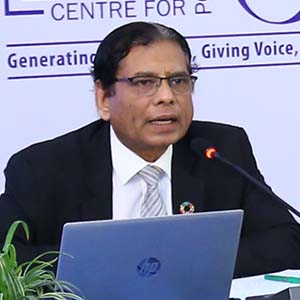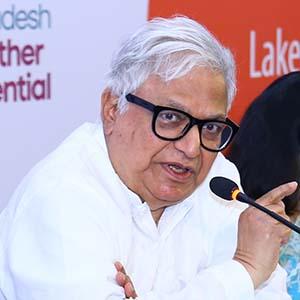
Bangladesh has historically maintained comfortable levels of external borrowings and manageable debt servicing liabilities. However, recent developments necessitate a re-evaluation of the concerned issues. Until recently, the country’s external borrowings as a percentage of Gross Domestic Product (GDP) have remained relatively low compared to many other developing countries, and its debt-carrying capacity has been within reasonable limits. However, disconcerting trends have emerged, particularly the rapid increase in external borrowings and debt servicing obligations in recent years, surpassing GDP growth, earnings from export of goods and services as also earnings from revenue. Notably, Bangladesh is not alone in facing these challenges; globally, there is a rapid rise in external debt and servicing obligations.
In this context, the Centre for Policy Dialogue (CPD), in partnership with The Asia Foundation – Bangladesh, organised a dialogue titled “Bangladesh’s External Borrowings and Debt Servicing Scenario: Are There Reasons for Concern?” on Thursday, 4 April 2024. The Keynote Presentation was made by Professor Mustafizur Rahman, Distinguished Fellow, CPD.

Dr Fahmida Khatun, Executive Director, CPD, chaired the session and remarked, ‘Failure to manage our debt will present numerous challenges, particularly amidst the backdrop of rising domestic demand on resources’. Compounding this issue, Bangladesh’s current economic landscape exhibits stagnant tax-to-GDP and revenue-to-GDP ratios, alongside volatile export income and sluggish remittance growth. In this backdrop, servicing debt has emerged as a significant challenge.
In his Keynote Presentation, Professor Mustafizur Rahman, cautioned about the negative implications of borrowing to repay external borrowings. In the view of this, he underscored the critical importance of prioritising the enhancement of Domestic Resource Mobilisation (DRM) through taxation, given the rising Public and Publicly Guaranteed (PPG) debt and servicing of growing the PPG debt. He emphasised the necessity of increasing direct taxes, reassessing tax expenditure and incentives, closing loopholes, broadening the tax net, and adopting a zero-tolerance stance against tax evasion.

Professor Rahman also stressed the significance of accurately estimating debt service obligations. He emphasised the need to ensure good governance in the implementation of Public Investment Projects (PIPs). Additionally, he highlighted the importance of considering exchange rate movements and the concept of dual graduation in decision-making processes. Furthermore, he advocated for the exploration of new funding sources and the diversification of development finance channels.
Professor Rahman advised maintaining vigilance over private sector borrowings and exercising caution regarding the implications of flexible exchange rates and project selection. He also encouraged seizing opportunities for debt restructuring where feasible and exploring concessional debt for trade financing from major importing sources. He emphasised the crucial need to strengthen capacity in loan negotiations to ensure favorable terms and conditions.

The Chief Guest, Dr Mashiur Rahman, Economic Adviser to the Hon’ble Prime Minister, Prime Minister’s Office, elaborated on the challenges emanating from exchange rate volatility. He pointed out factors hindering the success of the Public-Private Partnership (PPP) model in Bangladesh. He noted that private investment in PPPs primarily targets infrastructure projects, underpinning the importance of ensuring good value for money in this regard.
He pointed out that investors seek to mitigate the risks by incorporating specific clauses into contracts that guarantee their returns, which may not be always in the interests of receiving countries. Dr Rahman highlighted this as a potential barrier to successful PPP negotiation.

While discussing the debt financing, Professor Rehman Sobhan, Chairman, CPD, commented ‘If all infrastructure projects are financed through borrowing and end up being more expensive than necessary, it leads to unsustainable liabilities. In such a scenario, it is crucial to scrutinise all aspects, including project selection and project costs. He underscored the need to improve project management efficiency. He observed that project financing and equity participation by foreign investors should be carefully assessed.

Dr Debapriya Bhattacharya, Distinguished Fellow, CPD, said that the Government’s domestic borrowing surpasses its external borrowings by a factor of two. To gain a comprehensive understanding of the Government’s borrowing and debt situation, it is imperative to scrutinise both external and domestic borrowings of Bangladesh. He pointed out that per capita debt has been on the rise in the recent past, creating inter-generational transfer of debt repayment burden.
In his introductory remarks, Mr Kazi Faisal Bin Seraj, Country Representative, The Asia Foundation – Bangladesh, said ‘The primary concern lies in striking a balance between utilising external borrowings to drive development projects and safeguarding against the potential burden on future generations. This entails maintaining a delicate equilibrium between investment for growth and exercising prudent financial stewardship.’

Dr Salehuddin Ahmed, Former Governor, Bangladesh Bank, said ‘When contemplating loans for projects, it is crucial to proceed with caution and conduct thorough evaluation. We must carefully assess the feasibility of project implementation and establish a comprehensive step-by-step plan before securing foreign loans. Otherwise, regardless of the loan amount obtained, we may find ourselves unable to execute the project effectively and meet our debt obligations’.
‘As Bangladesh transitions from a least developed country to a developing one, its external borrowing and debt servicing landscape undergoes significant transformation’ remarked the President of Metropolitan Chamber of Commerce and Industry (MCCI), Mr Kamran T. Rahman. He highlighted that by September 2023, the country’s external debt soared to USD 96.5 billion, primarily driven by the need to finance development projects. With projections indicating further escalation, managing the sovereign debt will become increasingly crucial for sustainable economic growth.
High-level policy makers, trade specialists, business leaders, academics, development practitioners, civil society activists, international development partners and journalists were present at the dialogue, many of whom participated in the discussions.
Among them were — Dr Mohammed Farashuddin, Former Governor, Bangladesh Bank and Advisor and Coordinator, Department of Economics, East West University; Mr Mahbub Ahmed, Former Senior Secretary, Finance Division, Ministry of Finance; Ambassador Touhid Hossain, Former Foreign Secretary; Mr Mohammed Nurul Amin, Former Managing Director & CEO, NCC Bank Limited and Meghna Bank Limited; Mr Shams Mahmud, Former President, Dhaka Chamber of Commerce & Industry (DCCI) and Honorary Consul, Federal Democratic Republic of Ethiopia; Mr Jonaid Saki, Kendrio Shomonnyok, Gono Shonghoti Andolon; Mr A Gafur, Director, Abdul Monem Economic Zone Ltd and Country Adviser, American Apparel and Footwear Association (AAFA); and Dr Ashikur Rahman, Senior Economist, Policy Research Institute of Bangladesh.

